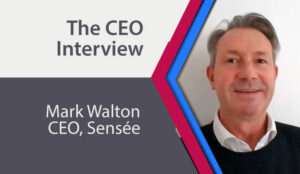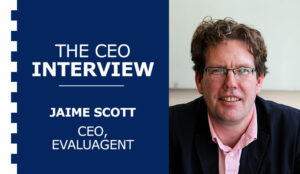Mark Walton introduces us to Sensée, before sharing some advice for managing remote teams and overcoming some key contact centre challenges.
Tell Us About Your History With the Company
I was invited to join Sensée by the shareholders two and a half years ago. Prior to that, I had spent my entire career in contact centres, outsourcing and customer service delivery roles.
It was so unusual and ahead of its time in its people focus.
Sensée is a fully remote outsourced contact centre, which also offers consulting services and its own technology solutions, which are designed for homeworking contact centres.
The position at Sensée attracted me because it was such a unique, disruptive business. It was so unusual and ahead of its time in its people focus.
What do you attribute your success to?
Generally, we have found success by having a really clear, simple strategy. That has been at the heart of how we have managed to treble the size of the business within the last two years.
Our strategy is focused on having a solution to clear industry problems. That should be the case with any business in any sector.
A couple of years ago we were struggling to convince the UK that homeworking was a sensible idea.
But, as Sensée is such a unique and disruptive business, a couple of years ago we were struggling to convince the UK that homeworking was a sensible idea.
It was initially an uphill struggle, yet I could see that this was a really brilliant idea and something that was only going to grow in time.
How has the contact centre industry changed since you became CEO?
While the industry was already changing, with everything that has happened in the last 12 months, we have seen contact centres evolve at a speed that we have never seen before.
Many of those changes were probably going to happen anyway, over the next 10 years, but they have been condensed into the last 12 months.

85–90% of customer-facing organizations had their people turn into homeworkers, and that has had a massive impact on the industry…
About 85–90% of customer-facing organizations had their people turn into homeworkers, and that has had a massive impact on the industry, in every way that you can imagine.
What do you predict will be the biggest change that will happen in the industry in the next five years?
The biggest change has already happened with the rise of homeworking and flexible work patterns.
Yet contact centres will continue to develop their homeworking strategies and, when they do so, they will realize a number of benefits, including accessing greater skill sets through recruiting from a wider talent pool.
Contact centres will continue to develop their homeworking strategies and, when they do so, they will realize a number of benefits…
This is especially beneficial given the rise in self-service and automation, which means that customer calls will become more complex – so customers will want and need to speak to really good people.
What do your clients tell you are their greatest challenges?
Throughout my entire time in the contact centre industry, the key challenges that people report have remained pretty constant. Such as delivering quality service at an acceptable price, meeting compliance obligations, and finding and keeping good people.
Many of these challenges have become even trickier to resolve over time. And I’d say that finding and keeping the very best people… is a good example.
However, many of these challenges have become even trickier to resolve over time. And I’d say that finding and keeping the very best people – in an industry that is, at the end of the day, often quite low paid – is a good example.
Attrition has long been a massive problem for the industry. Contact centre work can often be difficult and the environment intense – and those problems won’t go away anytime soon.
In addition, many clients say when they first engage with us that homeworking raises a whole series of new challenges, such as how do you:
- Keep people engaged?
- Effectively transfer the culture of the business to homeworkers?
- Look out for problems around stress and employee well-being?
Find out how you can navigate some of these new problems by reading our article: 15 Contact Centre Homeworking Problems and How to Overcome Them
What changes will your company be making over the next five years?
In essence, what we have done over the past 18 months – as we started before the COVID-journey – is take a step back and ask ‘what business problems can we solve?’
We intend to keep pressing forward with this approach, as we’ve been uncovering lots of challenges – a number of which I highlighted in my response to the previous question.
We are helping organizations overcome business challenges in three ways:
- Over the last decade and more we have developed a number of contact centre technology solutions for ourselves, and are now offering these to the wider market on a contact centre as a service (CCaaS) basis. These include solutions for internal communications, resource planning, recruitment/onboarding and security. All of these solutions are designed specifically to support remote contact centres.
- We have invested heavily in our consultancy service portfolio to help organizations understand what they should be aiming for, and how best to go about achieving those aims.
- We have invested heavily in our training and development function, and are using this to support organizations in better onboarding and coaching their own teams, as well as our own.
What is your proudest achievement at your company?
We’ve taken great pride in trebling the size of the business over the last two years. It’s been a remarkable team effort. And it’s not just been about trebling revenues, it’s also been about being able to offer a lot more high-quality jobs in these difficult times. That has been fantastic.
Today, we employ about 1,500 people across the UK and Ireland – and they are roles with lots of benefits, especially in terms of flexibility.
What is the most gratifying part of your job?
The most gratifying part… is to hear the stories of how their role within Sensée has made such a positive difference to their lives.
I try to speak to our customer-facing colleagues and team managers as often as I possibly can and the most gratifying part of that, for me, is to hear the stories of how their role within Sensée has made such a positive difference to their lives.
You can imagine lots of different situations with people who are:
- Living in really rural areas, frequently without access to good-quality local work
- Dealing with disabilities and who often find it difficult to get out of the house
- Carers to elderly relatives who find it difficult to work normal office hours
Giving these talented people significant roles is so gratifying, and then you get the feedback…
To hear how we have made such a difference to people’s lives. To hear how positive they are about the business. To hear how much they love to work for the company. That means so much.
What lessons have you learned from other contact centres that have helped to improve your operation?
I’m really impressed by companies that have a positive attitude towards their people. It’s no surprise when you find out that their contact centres have really high retention rates, good engagement and offer great customer service.
Northumbrian Water… is a great example of an organization that really cares about its people.
One organization that does this really well is Northumbrian Water – who we’ve done some work with. It is a great example of an organization that really cares about its people.
That is, after all, what puts contact centres ahead of the game, more so than the technologies, the metrics and so on. It feeds through to customer service and satisfaction.
What final pieces of advice would you offer our readers?
Stay open to new ideas. The success Sensée has enjoyed over the years is because we’ve questioned the status quo and in so doing become a major industry disruptor. I think we’re a great example of the success you can have when you find an idea that you know is good, and follow it through.
The second piece of advice is to never be afraid to fail. People who never make mistakes and never fail are the people that never try anything. You’ve really got to try new stuff and acknowledge that not all of it is going to work.
Finally, following the theme of staying open-minded, it is key to talk to people. The more people that you can talk to and network with, the better your own ideas will get.
In business, people have got so used to ignoring external approaches and ignoring emails from people that they don’t know. That’s such a shame because all the good ideas are sitting out there with people who you have not yet spoken to.
Author: Jonty Pearce
Published On: 3rd Feb 2021 - Last modified: 26th Feb 2025
Read more about - Expert Insights, Expert Interviews, Sensee















